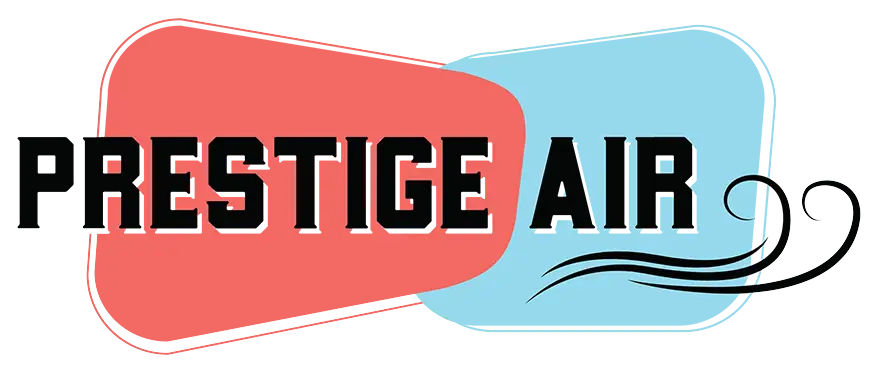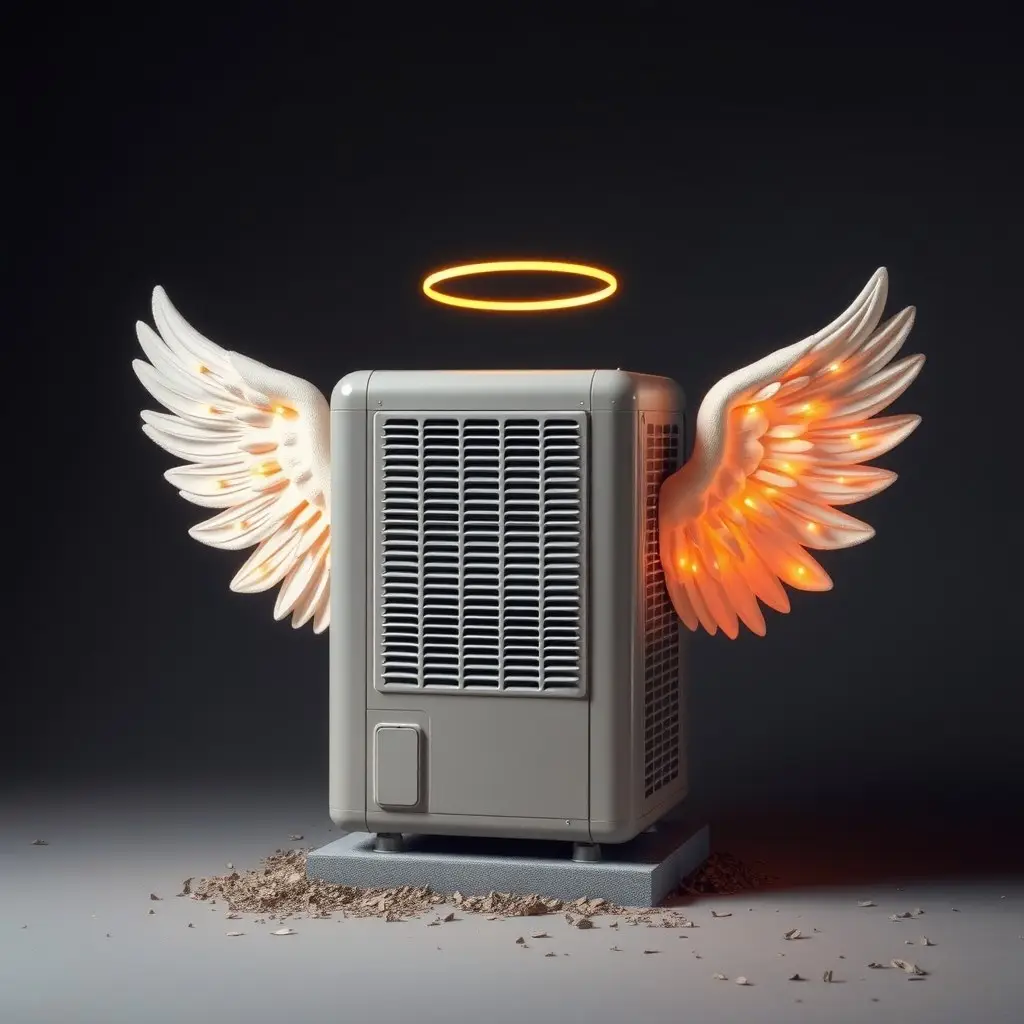Keeping your air conditioner running well does not just keep your home cool; it also saves money on energy bills. Here are 10 energy saving tips to help your AC work better and use less energy in Fort Worth, Texas.
Key Takeaways
- Keep your thermostat settings higher when you are home.
- Regular maintenance can extend the life of your HVAC system.
- Seal any leaks in your home to keep cool air inside.
- Use fans to help your AC feel cooler and improve AC efficiency.
- Close curtains or blinds to block out sunlight.
For those looking to enhance their cooling systems further, consider exploring options for energy-efficient appliances, energy-efficient windows, and smart home devices. Participating in local energy services can also provide incentives for improving your energy-efficient home.
To get a better understanding of system efficiency, click here.
1. Set Your Thermostat Wisely
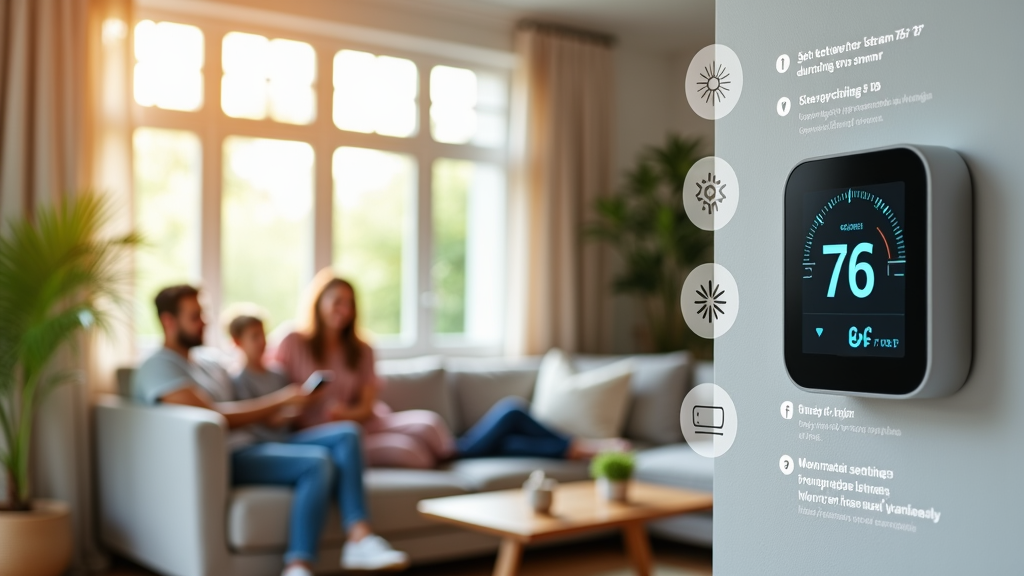
Firstly, your thermostat plays a big role in how much energy your AC uses. Set it a few degrees higher when you are home. Try to keep it around 78°F. This small change can lead to big savings on your energy bills. When you leave home, raise the temperature even more. If you have a smart thermostat, program it to adjust when you are away. Proper thermostat programming can greatly improve your AC efficiency and help with humidity levels. This is a key part of climate control in your home. Understanding your usage patterns can help you set the best temperature settings for comfort and savings. This is also a good way to practice energy management and develop energy-efficient habits.
2. Keep Up with Maintenance
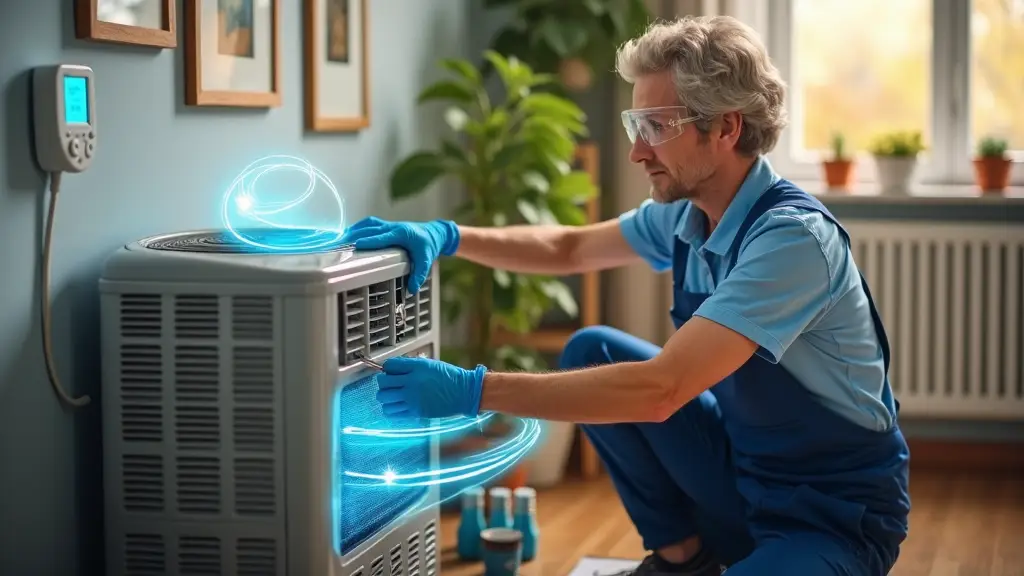
Regular maintenance is key to keeping your HVAC system running smoothly. Change the air filters every month, especially during the hot summer months. A dirty filter can make your AC work harder, increasing energy usage and costs. Schedule a system check-up with a professional at least once a year. During this time, a technician can check for issues, clean the system, and perform duct sealing if needed. This can help prevent costly air conditioning repairs down the line.
Common AC Maintenance Tasks
| Task | Frequency | Importance |
|---|---|---|
| Change air filters | Monthly | Ensures efficient airflow |
| Clean coils | Annually | Improves cooling efficiency |
| Check refrigerant levels | Annually | Prevents system overwork |
Maintenance Tips
Consider adding a cooling unit like a heat pump to your HVAC system. This can help with both heating and cooling, making it more efficient year-round. Also, don’t forget about winter preparation; ensuring your system is ready for colder months can save you money in the long run. Regular HVAC maintenance is a form of energy conservation that can lead to system optimization. Look for efficiency ratings on your appliances to ensure you are making the best choices for your home. Staying informed about energy policies can also help you make better decisions regarding your HVAC system. An energy assessment can identify areas where you can improve your system’s performance.
To learn more about how you can tune up your system, click here.
3. Seal Up Your Home
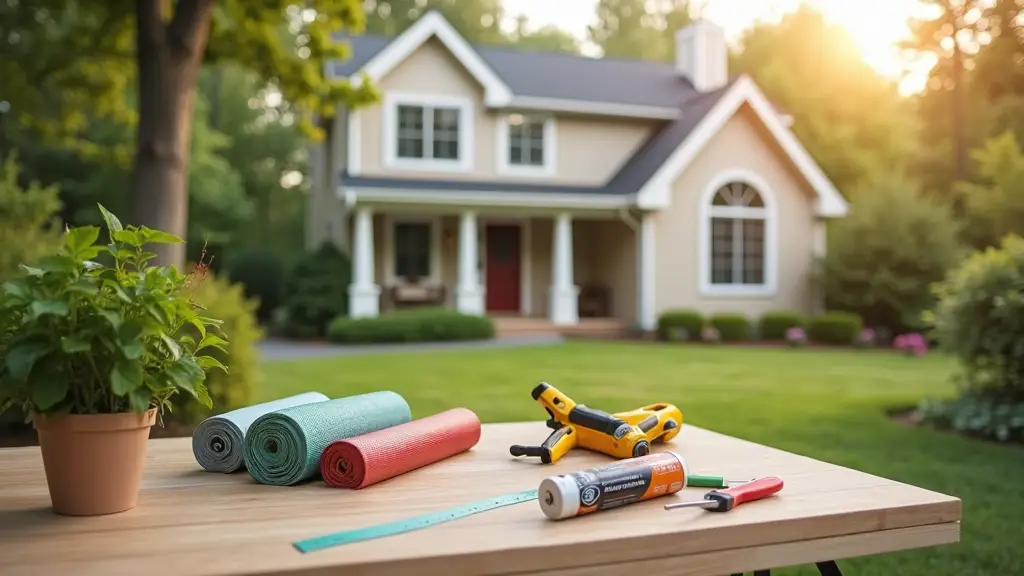
Air leaks around windows and doors can let cool air escape. This makes your AC work harder and increases cooling costs. Check for drafts and seal any gaps with weather stripping or caulk. This simple fix can keep cool air inside and hot air outside. You might notice a big difference in comfort and energy bills. Consider an energy audit to find areas where your home may be losing cool air. Upgrading to energy-efficient windows can also help improve your building envelope. Adding reflective window films can further reduce heat gain from the sun. Different insulation types can also help keep your home comfortable and reduce energy costs. These actions contribute to better home energy efficiency and can lessen your environmental impact.
4. Use Ceiling Fans Wisely
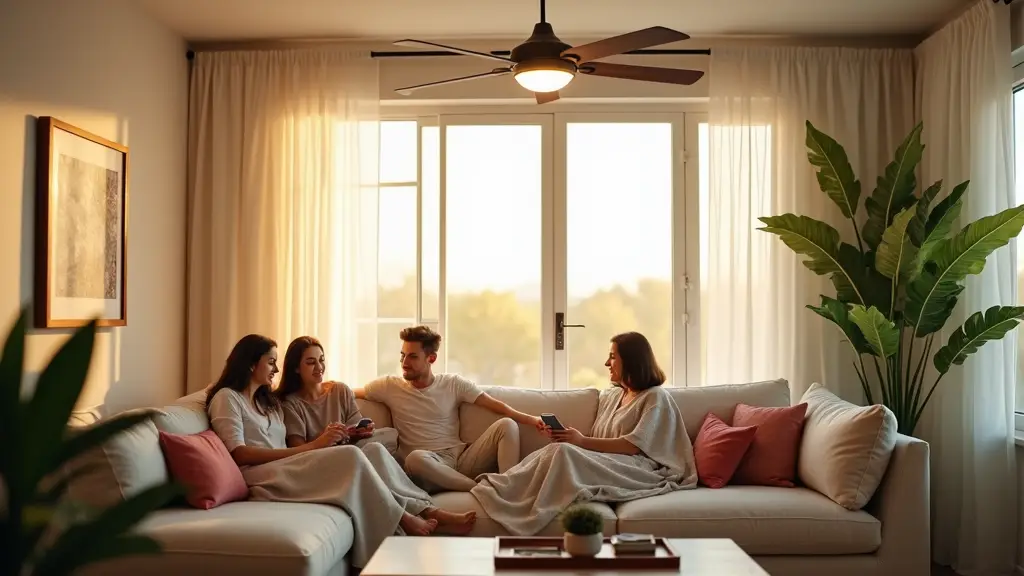
Ceiling fans can help your air conditioning work better. They create a wind-chill effect, making you feel cooler. Run your fans in a counter-clockwise direction during the summer months. This pushes cool air down into the room. Remember to turn the fans off when you leave the room, as they cool people, not spaces. Using fans wisely can enhance your comfort and improve AC efficiency. This is another way to practice energy conservation. By understanding your room placement, you can maximize airflow and cooling. This also promotes energy saving behaviors that can lead to lower bills.
Benefits of Ceiling Fans
- Enhanced comfort: Provides a breeze, making the room feel cooler.
- Energy efficiency: Reduces reliance on AC by improving airflow.
- Cost-effective: Low energy consumption compared to AC.
5. Close Curtains or Blinds
Sunlight streaming through your windows can heat up a room fast. Close your curtains or blinds during the hottest parts of the day. Use light-colored curtains to reflect sunlight. This can help keep your home cooler and reduce the load on your AC, leading to lower energy bills. Consider installing a cool roof to reflect more sunlight and reduce heat absorption. You might also explore various window treatments that can help block out heat. This is especially important in Fort Worth, where the sun can be intense. These cooling techniques can make a big difference in your comfort and support green building practices.
6. Limit Heat from Appliances
Some appliances give off heat. Try to avoid using the oven or stove during the hottest times of the day. Instead, cook meals in the early morning or late evening when it’s cooler. You can also use a microwave or slow cooker, which generate less heat. This helps your air conditioning system maintain better temperature control, especially during peak hours. Using dehumidifiers can also help reduce moisture in the air, making your home feel cooler without overworking your AC. Consider appliance upgrades to more energy-efficient models to further reduce heat output. This is a smart way to align with consumer awareness about energy use.
7. Keep Vents Clear
Make sure your AC vents are not blocked by furniture, rugs, or curtains. Clear vents allow air to flow freely. This helps your system work better and use less energy. Walk around your home and check all vents regularly to ensure optimal AC efficiency. Proper ventilation is crucial for maintaining a comfortable indoor environment. This is part of effective system optimization.
8. Use Energy-Efficient Light Bulbs
Switching to LED light bulbs can save energy. Traditional bulbs can heat up a room quickly. LED bulbs use less electricity and stay cool. This means your AC does not have to work as hard to cool down the heat from the lights, reducing energy consumption.
9. Insulate Your Home
Good home insulation can keep your home cool in the summer and warm in the winter. Check your attic and walls for proper insulation. If your home is not well-insulated, consider adding more insulating materials. This can be a bigger investment but will pay off in energy savings over time, especially in terms of cooling costs. Proper insulation also supports passive cooling strategies and enhances your building envelope. This is a key part of energy-efficient landscaping. Different insulation types can be more effective depending on your home’s design.
10. Consider Landscaping for Shade
Think about planting trees or bushes around your home. They can provide shade and help keep your house cooler. Planting trees on the south and west sides of your home is most effective. This natural shade can lower indoor temperatures and reduce your reliance on your AC, leading to lower energy bills. You might also consider using renewable energy solutions to power your home, which can further reduce your energy costs. Incorporating outdoor shade through landscaping is a smart way to enhance your home’s energy efficiency and can be part of broader energy policies aimed at reducing the energy crisis.
If you have questions about air conditioning maintenance, our team can guide you in ensuring your HVAC system is performing optimally. We can also help you explore zoning systems for better temperature control in different areas of your home.
Additional Energy Saving Tips
| Tip | Description | Estimated Savings |
|---|---|---|
| Install a Programmable Thermostat | Automatically adjusts temperature based on your schedule | Up to 10% off energy bills |
| Regularly Clean AC Coils | Keeps the system efficient | Improves efficiency by 5-15% |
| Upgrade to Energy Star Units | Newer models use less energy | Save 20-50% on cooling costs |
Quick Reference
- Maintain your AC: Schedule regular professional check-ups.
- Seal leaks: Use weather stripping or caulk around doors and windows.
- Utilize fans: Enhance cooling power with ceiling fans, but turn them off when not in use.
By implementing these strategies, you can optimize your air conditioning system’s efficiency and enhance your home’s comfort while reducing energy bills.
Lastly, to recap:
1. Change Your Air Filter Regularly: A dirty air filter can cause your HVAC system to work harder than necessary. Make sure to change your filter every one to three months to keep your system running efficiently.
2. Install a Programmable Thermostat: A programmable thermostat allows you to set different temperatures for different times of the day, ensuring that you’re not heating or cooling an empty house. This can save you up to 10% on your energy bills.
3. Keep Your Thermostat at a Reasonable Temperature: During the summer, set your thermostat to 78°F or higher when you’re home and 85°F when you’re away. During the winter, set it to 68°F or lower when you’re home and 55°F when you’re away.
4. Use Ceiling Fans: Ceiling fans can help circulate cool air in the summer and warm air in the winter, allowing you to rely less on your air conditioner and heater.
5. Seal Air Leaks: Air leaks can cause your HVAC system to work harder than necessary. Seal any gaps or cracks in your windows, doors, and walls to keep cool air in during the summer and warm air in during the winter.
6. Schedule Regular Maintenance: Regular maintenance can help your air conditioner and heater run efficiently and identify any potential problems before they become major issues.
7. Use Curtains or Blinds: Close your curtains or blinds during the day to keep out the heat during the summer and open them during the day to let in natural light during the winter.
8. Keep Your Outdoor Unit Clean: Clear any debris or plants around your outdoor unit to ensure that it has enough airflow to operate efficiently.
9. Use Exhaust Fans: Use exhaust fans in your bathroom and kitchen to remove excess heat and moisture from your home, which can make your HVAC system work harder.
10. Upgrade Your System: If your HVAC system is more than 10 years old, consider upgrading to a high-efficiency system. This can save you up to 20% on your energy bills and provide better comfort.
By following these ac energy-saving tips, you can keep your air conditioner and heater running efficiently and save money on your energy bills. If you need any help with maintenance or upgrades, don’t hesitate to contact Prestige Air at 817-200-7215. Our expert technicians are ready to assist you.
Prestige Air proudly serves Northeast Tarrant County and the Fort Worth, Texas area including Hurst, Euless, Bedford, Colleyville, Grapevine, Southlake, Westlake, Trophy Club, Keller, Watauga, Haltom City, and North Richland Hills. We look forward to serving you and your household!
